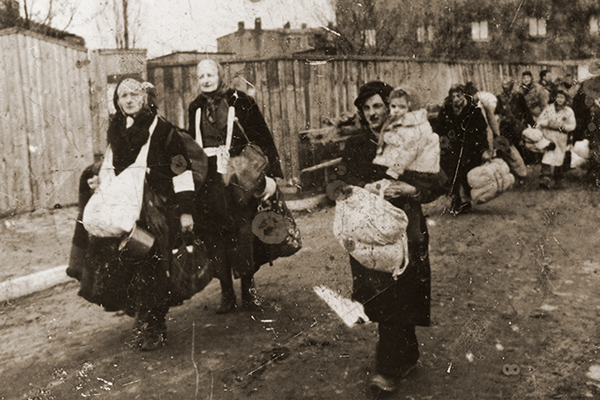
Elderly women carrying young children and bundles of personal belongings trudge along a street in the Łódź ghetto toward the assembly point for deportations to Chełmno. US Holocaust Memorial Museum, courtesy of Muzeum Sztuki w Łodzi
Dr. Elizabeth Strauss examines the intrinsic connection between individual and communal experiences during the Holocaust. Using German and Yiddish-language archival sources generated by German authorities and Jewish inhabitants of the Łódź ghetto, Dr. Strauss argues that age is an essential category of analysis for elucidating the particular nature of Nazi persecution and for understanding the cumulative effects of ghettoization on Jewish communities. The manuscript testifies to the range of human behavior that emerged in response to conditions of extreme persecution during the Third Reich and presents the intertwined fate of aged individuals and their larger communities, both living on the brink of annihilation.
Dr. Strauss conducted extensive archival research for her current project in New York City, Washington, DC, Germany, and Israel. Her research has been funded by a number of awards and fellowships, including: the Saul Kagan Claims Conference Fellowship for Advanced Holocaust Studies from the Conference on Jewish Material Claims Against Germany; the Barbara and Richard Rosenberg Fellowship from the Jack, Joseph and Morton Mandel Center for Advanced Holocaust Studies at the United States Holocaust Memorial Museum; the Dr. Sophie Bookhalter Fellowship in Jewish Culture from the Center for Jewish History in Manhattan; and the Maria Salit-Gitelson Tell Memorial Fellowship from the YIVO Institute for Jewish Research.
Dr. Strauss is an assistant professor of history at Mount St. Mary’s University. She graduated from the University of North Carolina-Chapel Hill (UNC) in 2002 with a bachelor’s degree in Germanic languages and literatures. Upon completion of an interdisciplinary transatlantic curriculum at UNC and Humboldt University in Berlin, Germany, she was awarded a master’s degree in political science. Dr. Strauss also earned a master’s and doctorate in history from the University of Notre Dame in 2014.
In addition to teaching in the Mount Saint Mary’s Humanities Core Curriculum, Dr. Strauss offers history electives on modern European history, the Holocaust, Nazi Germany, the Cold War in Europe, history of the family, genocide in the 20th century, and the Israeli–Palestinian conflict. Prior to joining the Mount’s faculty full time in fall 2016, Dr. Strauss worked as a contributor to the Museum’s Encyclopedia of Camps and Ghettos.
Speaker
Dr. Elizabeth Strauss, Assistant Professor, Mount St. Mary’s University
This program is made possible by the Campus Outreach Lecture Program of the United States Holocaust Memorial Museum's Jack, Joseph and Morton Mandel Center for Advanced Holocaust Studies, supported by the Leonard and Sophie Davis Fund.
